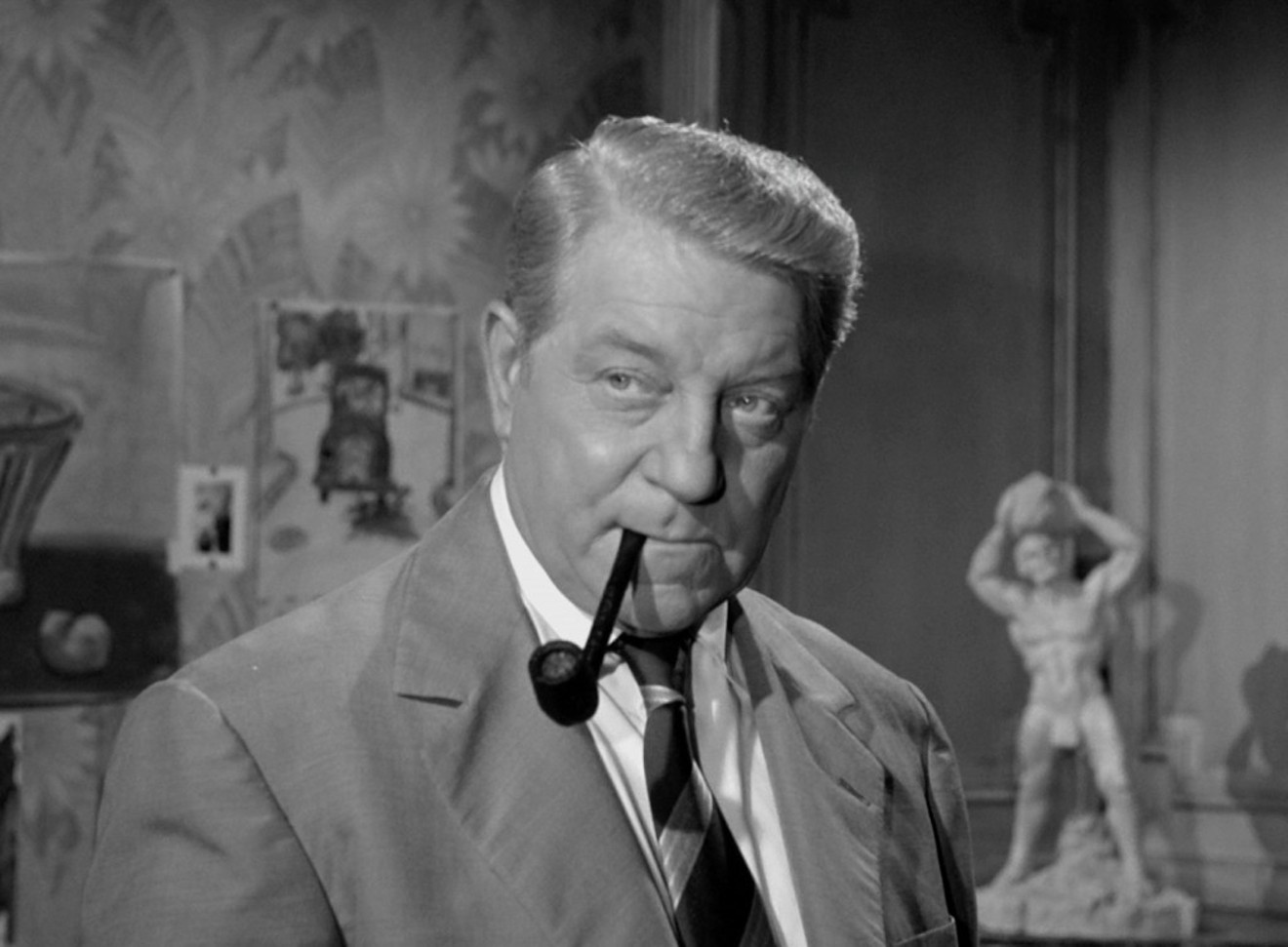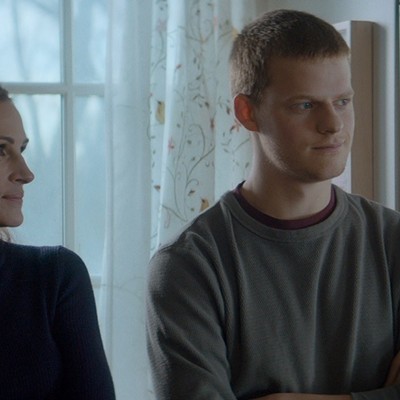Few critics have laid waste to an artist’s reputation as definitively as Francois Truffaut laid waste to the director Jean Delannoy’s. Firebrand Truffaut, in his early-to-mid 20s in the early-to-mid ’50s, often called upon the readers of Cahiers du Cinema to rise up against French cinema, and he assailed Delannoy, a Palme d’Or winner for 1946’s La Symphonie Pastorale, for crafting drearily professional, impersonal films that evince nothing of their creator’s sensibility other than an interest in empty quality. This lion of the coming nouvelle vague called Delannoy “a man who is not intelligent enough to be cynical, too cunning to be sincere and too pretentious and solemn to be be straightforward,” and insisted that worst of the movies by a film artist like Jean Renoir would always be better than Delannoy’s best. Delannoy, for his part, insisted that his job as a director was not to stamp a movie with his own perspective — it was simply to honor the script.
Among film aesthetes today, auteurism is misunderstood as a kind of hero-worshipping cant, an insistence on the director as god — of course a top Delannoy couldn’t be as interesting as a secondary Renoir. Kino Lorber’s sparkling restoration of Delannoy’s 1958 hit Maigret Sets a Trap, offers a rare chance to test Truffaut’s dictum in an American theater. It seems to me the best of the several Delannoy films I’ve seen, but is it actually interesting?
Based on a characteristically sharp Georges Simenon novel, and featuring the indomitable Jean Gabin (who starred in no less a Renoir than Grand Illusion) at the start of his bearish sourpuss phase, this first of Delannoy’s two films about Parisian police inspector Maigret might seem like a case where just honoring the script stands as the best way to go. The crisp opening sequence finds Delannoy’s camera tracking, with alert precision, a murderer’s spree through the shadowed streets of the 4th arrondissement. Then our detective turns up, crabby and a little bored, arranging the first of several of his traps to capture the killer, who it turns out has for months been killing women of a certain type. Maigret marshals a squad of women — full-figured brunettes — who match the murderer’s interest, and then sends them out into the streets with whistles for some minor defense training. On location, shooting through windows and down alleys, Delannoy summons up interest and even excitement, especially when the story turns nasty.
But oh, dear me, the interior scenes fail to honor Simenon’s whetted prose. Even Gabin, so commanding a presence, can’t always hold our attention in the many flat, protracted colloquies in offices and apartments that all look cavernous in that way of a set on a stage. Why does 30 feet of empty gulf a police inspector’s desk and his door? In his own films, beginning a year after Maigret with The 400 Blows, Truffaut would take steps to liberate moviemakers from the tyranny of the proscenium arch, that habit of positioning the camera as if it were an audience member regarding the performers in a play. Delannoy’s staid and wearying scene craft deserves credit, I guess, for inspiring so thrilling a corrective.
That’s not to say the film’s devoid of interest. Simenon’s mystery turns on failed marriages and domineering mothers and — much like Tomas Alfredson’s The Snowman — that ridiculous serial killer habit of sending taunting missives to the cops on the case. Mystery fans may enjoy drinking deep from the headwaters of cliche. The killer eventually gets revealed as — this is a spoiler, of course — an entitled man-baby who can’t satisfy his wife sexually and remained a child at heart due to his mother’s smothering insistence that he was born brilliant. Maigret soundly dresses him down in the final scenes, sounding something like boomers crabbing about millennials — or an older artist swiping at the bratty kids nipping at his heels. Who says Delannoy’s films never got personal?
Support Us
Houston's independent source of
local news and culture
account
- Welcome,
Insider - Login
- My Account
- My Newsletters
- Contribute
- Contact Us
- Sign out
Maigret Sets a Trap Finds Truffaut’s Greatest Enemy Scoring a Hit With Paris’ Greatest Detective
Alan Scherstuhl October 16, 2017 11:00PM

Jean Gabin plays the crabby — and a little bored — Parisian police inspector Maigret trying to capture a killer in Jean Delannoy’s 1958 hit Maigret Sets a Trap.
Courtesy of Kino Lorber
[
{
"name": "Related Stories / Support Us Combo",
"component": "11591218",
"insertPoint": "4",
"requiredCountToDisplay": "4"
},{
"name": "Air - Billboard - Inline Content",
"component": "11591214",
"insertPoint": "2/3",
"requiredCountToDisplay": "7"
},{
"name": "R1 - Beta - Mobile Only",
"component": "12287027",
"insertPoint": "8",
"requiredCountToDisplay": "8"
},{
"name": "Air - MediumRectangle - Inline Content - Mobile Display Size 2",
"component": "11591215",
"insertPoint": "12",
"requiredCountToDisplay": "12"
},{
"name": "Air - MediumRectangle - Inline Content - Mobile Display Size 2",
"component": "11591215",
"insertPoint": "4th",
"startingPoint": "16",
"requiredCountToDisplay": "12"
}
,{
"name": "RevContent - In Article",
"component": "12527128",
"insertPoint": "3/5",
"requiredCountToDisplay": "5"
}
]
KEEP THE HOUSTON PRESS FREE...
Since we started the Houston Press, it has been defined as the free, independent voice of Houston, and we'd like to keep it that way. With local media under siege, it's more important than ever for us to rally support behind funding our local journalism. You can help by participating in our "I Support" program, allowing us to keep offering readers access to our incisive coverage of local news, food and culture with no paywalls.
Alan Scherstuhl is film editor and writer at Voice Media Group. VMG publications include Denver Westword, Miami New Times, Phoenix New Times, Dallas Observer, Houston Press and New Times Broward-Palm Beach.
Contact:
Alan Scherstuhl
Follow:
Twitter:
@studiesincrap
Trending Film
- It’s Sadly Kind of Perfect That New Season of GLOW Is Stolen by Marc Maron
- Hard-Knock Life in Frozen River
- Made in Houston
-
Sponsored Content From: [%sponsoredBy%]
[%title%]

Don't Miss Out
SIGN UP for the latest
news, free stuff and more!
Become a member to support the independent voice of Houston
and help keep the future of the Houston Press FREE
Use of this website constitutes acceptance of our
terms of use,
our cookies policy, and our
privacy policy
The Houston Press may earn a portion of sales from products & services purchased through links on our site from our
affiliate partners.
©2024
Houston Press, LP. All rights reserved.





